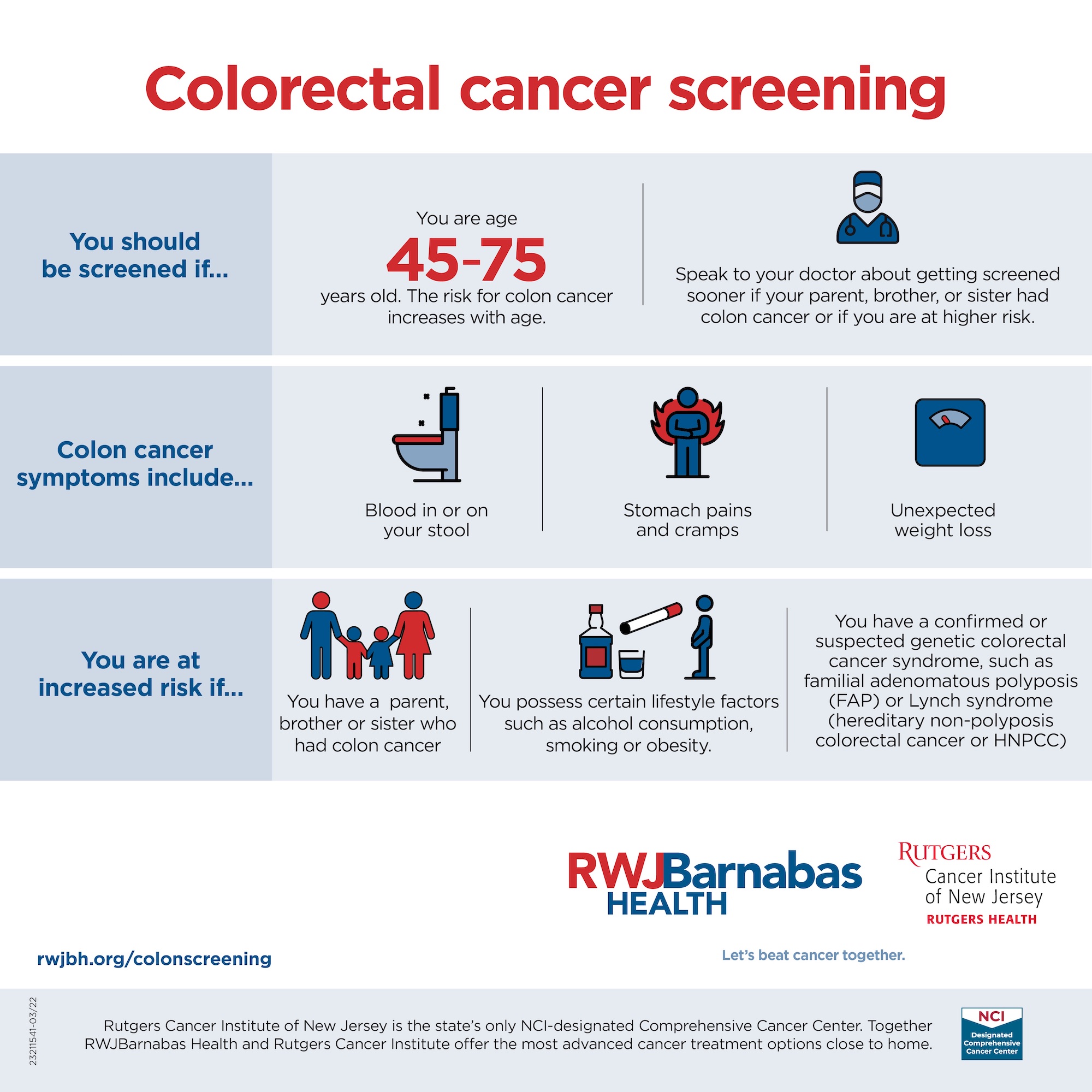 Colorectal cancer is the third most common type of cancer in both men and women and is the second leading cause of cancer death after lung cancer. Many colorectal cancers can be prevented through regular screening. Screening can find precancerous polyps—abnormal growths in the colon or rectum—so that they can be removed before they turn into cancer.
Colorectal cancer is the third most common type of cancer in both men and women and is the second leading cause of cancer death after lung cancer. Many colorectal cancers can be prevented through regular screening. Screening can find precancerous polyps—abnormal growths in the colon or rectum—so that they can be removed before they turn into cancer.
Several screening tests have been developed to help doctors find colorectal cancer early, when it may be more treatable. We know that detecting colorectal cancer at an early stage improves survival rates. The five year survival rate for people diagnosed with early stage colon cancer ranges from 53% to 92%, compared to only 11% for persons diagnosed with metastatic Stage IV colon cancer. While colon cancer occurs most often in people over the age of 50, there is an increasing incidence rate in younger individuals.
The guideline for colorectal cancer screening recommends that average-risk adults aged 45 years and older with no symptoms undergo regular screening. As a part of the screening process, all positive results on non-colonoscopy screening tests should be followed up with timely colonoscopy.
Articles & Blogs
 45 is the New 50 for Colorectal Cancer Screening
45 is the New 50 for Colorectal Cancer Screening
The U.S. Preventative Services Task Force (USPSTF) recommends that people begin colorectal cancer screening at age 45, rather than 50, which was the previous recommendation. The updated guidelines consider the benefits of early detection and treatment for adults with no personal history or increased risk of the disease. Read more
 Why is Colorectal Cancer on the Rise in Younger People?
Why is Colorectal Cancer on the Rise in Younger People?
In recent years, colorectal cancer diagnoses and deaths among individuals younger than 50 years of age have increased, which has raised many questions about who should be screened for colorectal cancer and has even prompted the United States Preventative Task Force (USPTF) and American Cancer Society to update their screening recommendations. Read more
 Exploring Racial and Ethnic Disparities in Colorectal Cancer Screening
Exploring Racial and Ethnic Disparities in Colorectal Cancer Screening
Over the last decade, health systems have put a stronger emphasis on making preventive care accessible and equitable, which has contributed to a reduction in colorectal cancer incidence and mortality for the general population. However, significant disparities persist among some racial and ethnic groups. Read more
 Finding Resources for Colorectal Cancer Screening
Finding Resources for Colorectal Cancer Screening
By raising awareness about colorectal cancer and minority health disparities, communities, organizations and health professionals can take action toward prevention and early detection. Read more
 ScreenNJ
ScreenNJ
ScreenNJ was developed under the leadership of Rutgers Cancer Institute in partnership with the New Jersey Department of Health. The initiative is a collaboration of organizations across the state committed to reducing cancer incidence and mortality through outcomes-oriented, evidence-based cancer prevention and screening programs. The public can utilize this resource to find local colorectal (as well as lung) cancer screening programs and information about the types of testing and benefits. Learn more
 Colorectal Cancer Screening Awareness Month
Colorectal Cancer Screening Awareness Month
Routine colorectal cancer screenings make a significant difference in early detection to improve cancer outcomes. Whether through screening awareness, the offering of innovative treatments or the development of new therapies, Rutgers Cancer Institute in partnership with RWJBarnabas Health remains a statewide resource in advancing our understanding about colorectal cancer. Learn more
Resources
Gastrointestinal Oncology Program
Colorectal Cancer Recommended Websites
Colorectal Cancer Clinical Trials
ScreenNJ

